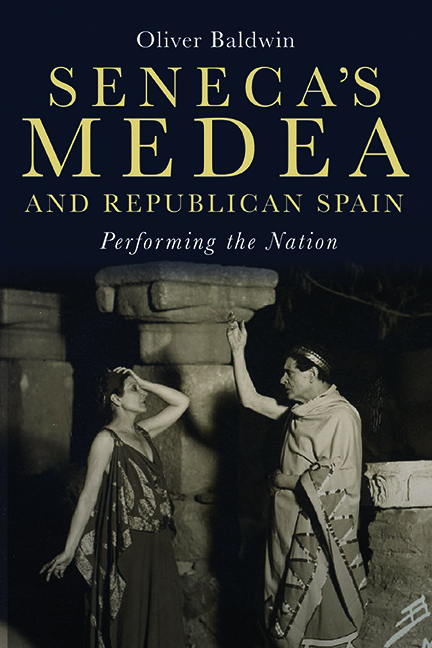Book contents
- Frontmatter
- Dedication
- Contents
- List of illustrations
- Acknowledgements
- List of abbreviations
- Introduction: A Spanish Medea in Republican Spain
- I Seneca’s Medea in Mérida: A reconstruction
- II Seneca and Hispania
- III Republica nunc sum: Building a Republic
- IV Medea and the social revolution
- V Hispano-Roman tragedy on a reformed stage
- Conclusion: The Republican Medea that was in Mérida
- Bibliography
- Index
IV - Medea and the social revolution
Published online by Cambridge University Press: 07 October 2022
- Frontmatter
- Dedication
- Contents
- List of illustrations
- Acknowledgements
- List of abbreviations
- Introduction: A Spanish Medea in Republican Spain
- I Seneca’s Medea in Mérida: A reconstruction
- II Seneca and Hispania
- III Republica nunc sum: Building a Republic
- IV Medea and the social revolution
- V Hispano-Roman tragedy on a reformed stage
- Conclusion: The Republican Medea that was in Mérida
- Bibliography
- Index
Summary
The prison is demolished. It's something. It's a lot. But now, on the site, we have to plant the orchard (María Lejárraga)
The arrival of the Second Spanish Republic offered an opportunity for initiating integral socio-political reforms. Education and Culture, Women's Rights, Agrarian Reform, Militarism, Territory, Labour, and Secularism were the seven main areas in which the Republic had to demonstrate practical capacities beyond an inspiring rhetoric. These areas were primarily addressed in the first two years of its existence, between April 1931 and the elections in November 1933. These are to be considered as the years of republican nation-building, which would later be amended or revitalised by subsequent governments, and which founded many of the aspirations, claims, troubles and grievances to later permeate the Spanish Civil War. Given this convulsive atmosphere of socio-political change, how did the audience at Mérida, and those in its subsequent tour, establish connections or comparisons between Seneca's Medea and the fundamental political and social changes the Spanish nation was undergoing?
Spain reflected itself in Seneca's Medea as a socio-political mirror, in which different social groups could visualise their own interests, concerns and hopes, however clear or distorted these may have appeared. All seven areas of reform can be seen as echoed in some way in the performance, the text of Seneca's Medea, or even its Roman origins or location in Mérida. For example, agrarian reform appears connected to Seneca's Medea in the opposition press when Mérida is mentioned as having been a Roman town, Emerita Augusta, whose land was granted to retired Roman soldiers: ‘So does that mean that the Agrarian Reform is a Roman thing?’, asks Gracia y Justicia. Elsewhere in the same issue one can read: ‘the Agrarian Reform is Azaña's best work after Medea and La Corona’, the latter being a play written by Azaña in reality. It is not necessary to document again here how Seneca's Medea became emblematic of the broad reform on education and culture under the Republic (see pp. 116–47). The presence of many military officers loyal to the Republic in Mérida on the eve of the trial of the civic-military conspiracy of the Sanjurjada, alongside the close identification of Seneca's Medea with the new republican regime, also point towards a subtext that coincides with the Republic's efforts in military reform.
- Type
- Chapter
- Information
- Seneca's Medea and Republican SpainPerforming the Nation, pp. 171 - 210Publisher: Boydell & BrewerPrint publication year: 2022



